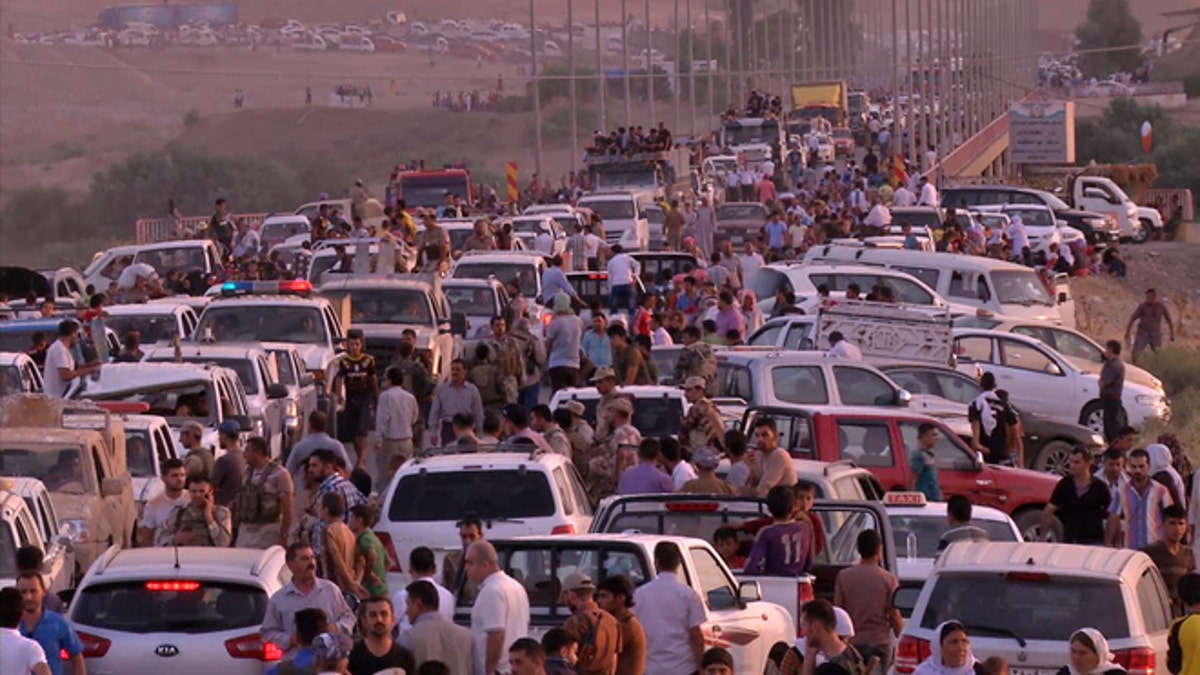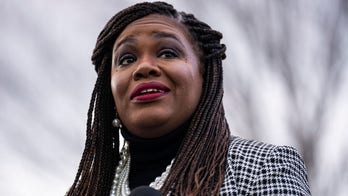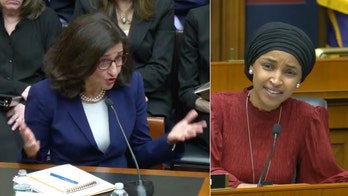
This image made from video taken on Aug. 3, 2014 shows Iraqi people from the Yazidi community arriving in Irbil in northern Iraq after Islamic militants attacked the towns of Sinjar and Zunmar. (AP)
Iraqi militants seized control Thursday of the country's largest Christian city -- reportedly telling its residents to leave, convert or die -- while members of another religious minority remained trapped on a mountain without enough food or water, circumstances that fueled calls for the U.S. and U.N. to get more involved.
In response, Pentagon officials told Fox News the administration is considering humanitarian aid drops for the families stuck on the mountain in northern Iraq, and noted they have been "urgently and directly" working with officials to coordinate Iraqi airdrops to those in need. The New York Times reports that officials also are considering airstrikes.
White House Press Secretary Josh Earnest would not confirm Thursday whether airstrikes are on the table, but said the situation is nearing a "humanitarian catastrophe" and is one "we are deeply concerned about and closely monitoring."
The takeover in Qaraqoush is the latest in a basket of foreign policy crises testing the Obama administration. Secretary of State John Kerry dropped into Afghanistan unannounced Thursday to meet with feuding presidential candidates, on the heels of a U.S. general's murder at an army training post -- while the White House plots its next move in a tense chess match over Ukraine with Russian President Vladimir Putin.
Meanwhile, one U.S. lawmaker is warning that the latest developments in Iraq could become a "genocide," as the Islamic State (IS) -- the militant group formerly known as ISIS -- continues its march through the north, imposing its brand of Islam on Christians and other minorities.
"Genocide is taking place before our eyes -- and on your watch -- in Iraq," Rep. Frank Wolf, R-Va., wrote in a letter earlier this week to Obama.
France on Thursday called for an urgent U.N. Security Council meeting on the crisis.
In the latest development, IS militants overran a cluster of predominantly Christian villages alongside the country's semi-autonomous Kurdish region, sending tens of thousands of civilians and Kurdish fighters fleeing from the area, according to several priests in northern Iraq.
The capture of Qaraqoush, Iraq's biggest Christian city, and at least four other nearby hamlets, brings the group to the very edge of the Iraqi Kurdish territory and its regional capital, Irbil.
The Islamic State has already seized large chunks of northern and western Iraq in a blitz offensive in June, including Iraq's second-largest city of Mosul. The onslaught has pushed Iraq into its worst crisis since the 2011 withdrawal of U.S. troops.
Last week, the Islamic State also seized the northwestern town of Sinjar, forcing tens of thousands of people from the ancient Yazidi minority to flee into the mountains and the Kurdish region.
According to the U.N., between 35,000 and 50,000 fled to nearby Mount Sinjar and other areas, "reportedly surrounded by ISIS armed elements" and lacking water and other aid.
The Washington Post detailed dire circumstances, reporting Thursday that thousands of families hiding on Mount Sinjar are desperate for help and that Iraqi government airdrops of aid are not sufficient. According to the Post, some water bottles also cracked open during the drop.
Reuters reported Thursday that a rescue is underway, and some of the thousands trapped on the mountain have been brought to safety.
But Wolf, in his letter to the president, said the situation deserves higher-level involvement from the Obama administration.
"Time is running out," Wolf wrote. He called for a senior official to be appointed as the "lead person" to coordinate government resources, and greater cooperation with NGOs like UNICEF to channel food and other aid to the victims.
White House Press Secretary Josh Earnest said Tuesday that the U.S. is supporting the Iraqi security forces and the Kurdish Peshmerga forces defending these areas. He said joint operations centers -- set up after IS first started making significant gains across the region -- in Irbil and Baghdad are sharing information.
Earnest said U.S. and Iraqi officials are discussing a "coordinated approach to the humanitarian situation in that region of the country."
"We urge all Iraqi authorities, civil society and international partners to work the United Nations and its partners to deliver lifesaving humanitarian assistance," he said.
The highest level statement on the matter has come from Samantha Power, U.S. ambassador to the U.N.
Power condemned the attacks "that have reportedly led to the displacement of tens of thousands of people, many from vulnerable minority communities, deepening Iraq's already acute humanitarian crisis." She urged all parties to allow "safe access" to the U.N. and its partners to deliver aid, including to families stuck on Mount Sinjar.
"The United States is committed to helping the people of Iraq as they confront the security and humanitarian challenges in their fight against [IS]," she said, urging Iraq's leaders to swiftly form a "new, fully inclusive government."
But the Hudson Institute's Nina Shea earlier this week criticized Obama and Kerry for not personally speaking out on the "epic humanitarian and human-rights catastrophe" in this part of Iraq, where Christians and other minorities have lived for hundreds of years.
In a column for National Review, she urged the U.S. to respond to the Kurds' plea for arms to defend the region, aid resettlement efforts for displaced minorities and try to help warn "local populations of impending attacks."
The Associated Press contributed to this report.




